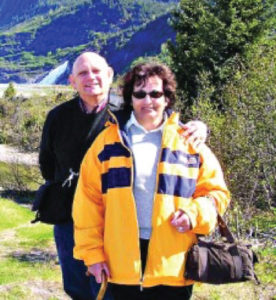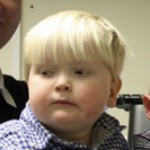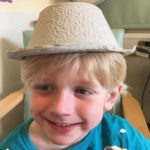Looking back over my life, I can’t quite believe how much I pushed myself to do despite my Tarui disease (GSD7) – only a handful of people in the UK have been diagnosed. It is more common in Ashkenazi Jews, but the exact incidence is not known.
Problems from childhood but diagnosed at 32
I was around 11 when the family realised things weren’t quite right. My legs always ached and I’d have to stop often to rest whenever I walked anywhere. As a child I found I couldn’t keep up when walking with my friends, especially uphill. I remember when I was 18 going on a ramble with a boyfriend and he literally dragged me up a hill to where I could sit. All this was very embarrassing. I was also no good at sport. I never ran. I just struggled on.
It was not until I was 32 that I was diagnosed with GSD7. One night while suffering from flu, I was so weak I fell halfway out of bed and could barely move. Scared, my husband Laurence rang for an ambulance but in hospital the doctors initially had no idea what was wrong, or how to treat me. They gave me a massive dose of steroids, which seemed to enable me to sit up, but I had no strength in my muscles. I had many tests, but was discharged after two weeks still without a formal diagnosis.
I carried on as before
I was living in Watford but was referred to the National Hospital for Neurology and Neurosurgery in Queen’s Square, London. There, I had numerous blood tests and a muscle biopsy and was finally diagnosed. At first, my life did not change, as I had to carry on running a busy home, looking after my two sons – then aged two and four – and later going back to my secretarial career. As there was no cure, I just carried on, not realising what damage I was doing to myself. I did much too much, but I didn’t want my family to suffer.
The diagnosis, information and care is better these days

Marilyn and her husband Laurence
Looking back over my life, I can’t quite believe how much I pushed myself to do despite my Tarui disease (GSD7) – only a handful of people in the UK have been diagnosed. It is more common in Ashkenazi Jews, but the exact incidence is not known.
My current specialist, Dr Ros Quinlivan of the Queen’s Square hospital, explains: “GSD7 is a very rare disorder caused by the absence of an enzyme called phosphofructokinase, which is essential for skeletal muscle to burn glucose during activity. The consequence is muscle fatigue, pain, cramping and sometimes severe muscle damage, which can lead to a Coca-Cola discolouration of the urine (myoglobinuria). Episodes of acute muscle damage can be very serious and require intensive care with kidney dialysis.”
Nobody else in the family affected
The condition is caused by the inheritance of two abnormal copies of the PFKM gene, one from each parent. My parents, like all carriers, did not have symptoms and only discovered that they carried the abnormal mutation when they I was diagnosed. Following my diagnosis, my blood relatives were tested, but thankfully no one else was found to have it.
I had a kidney transplant in 2009 after my kidneys were found to be failing. I started to take things easier after my referral to the Queen’s Square clinic. Even the simplest tasks like washing and drying my hair can cause discomfort. It is debilitating, especially when you outwardly look alright. I have to think carefully before I do anything, such as playing with my grandchildren. But I don’t let this disease beat me.
I was the AGSD-UK coordinator for GSD7 for several years and was very pleased to be able to help others learn to manage this condition.

































